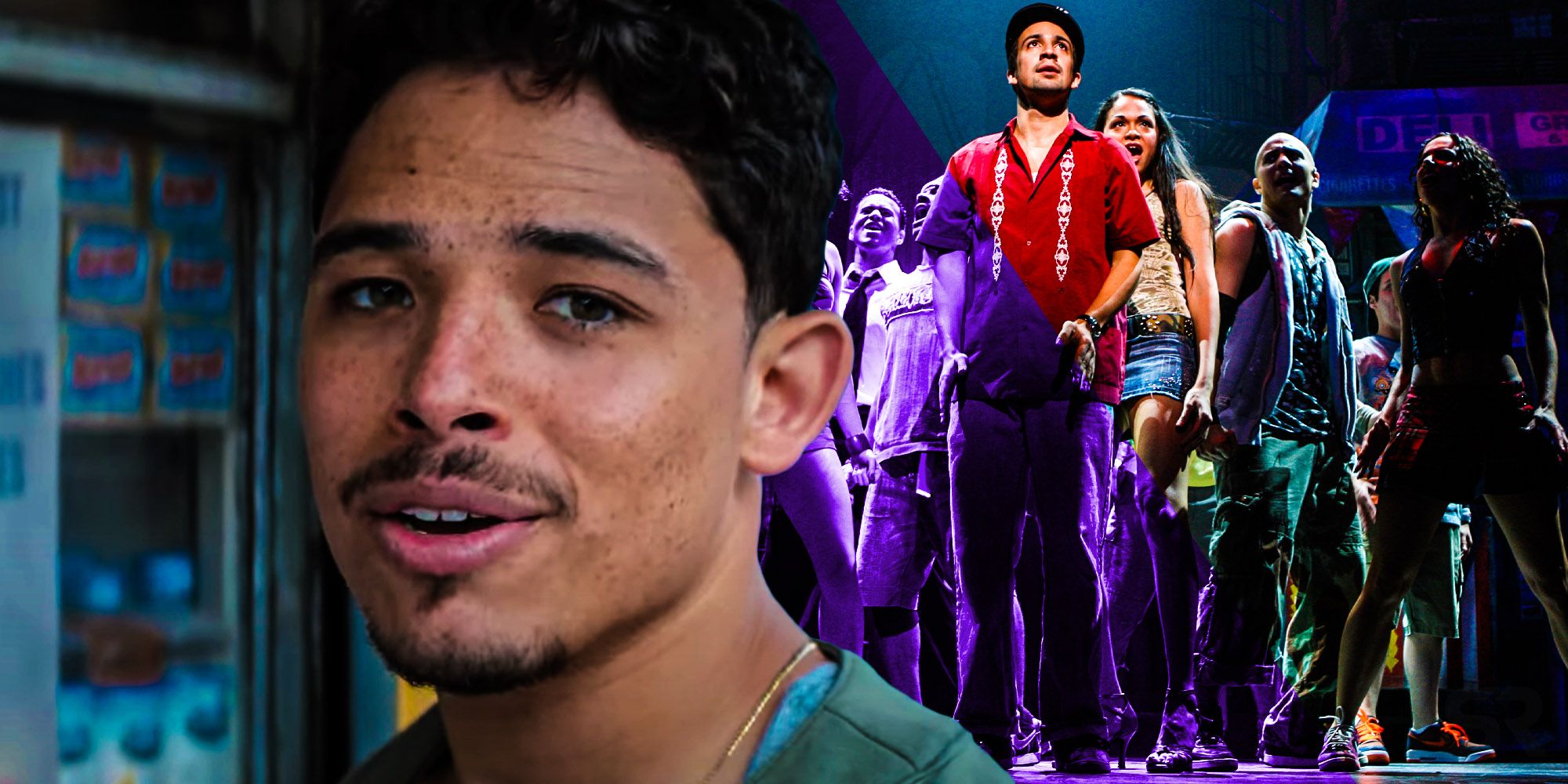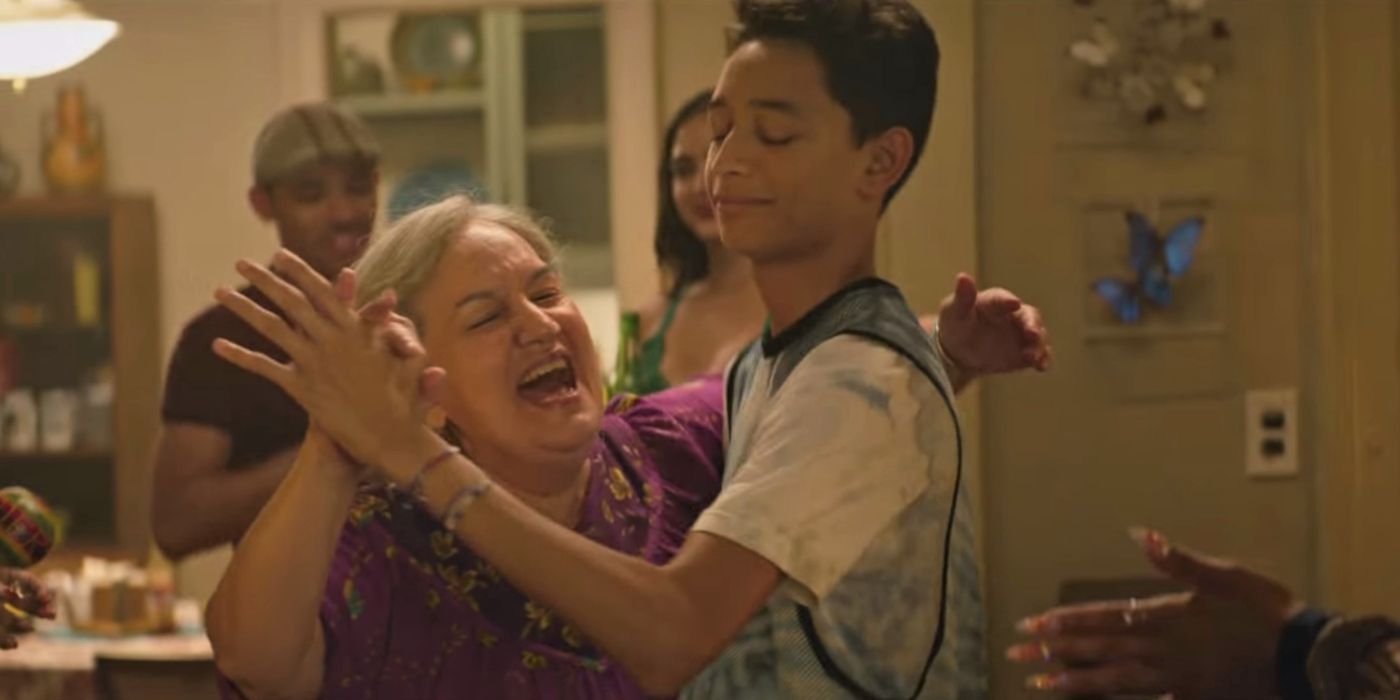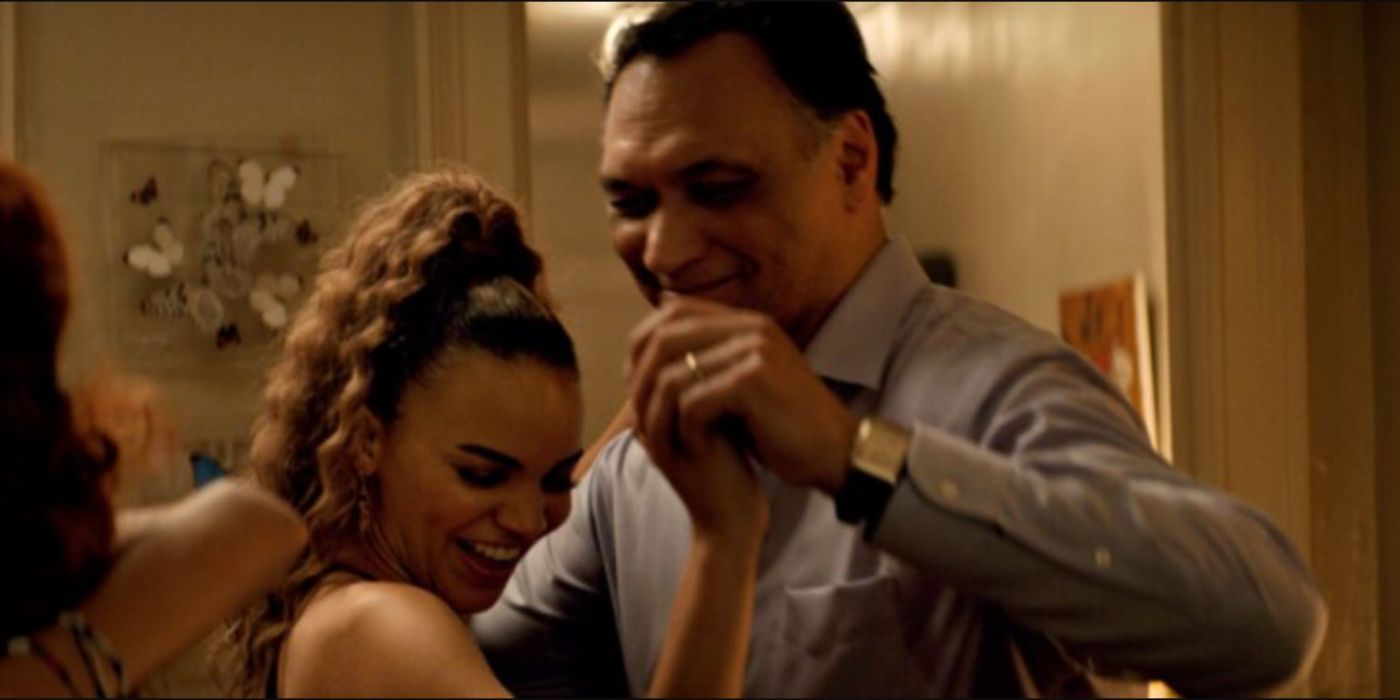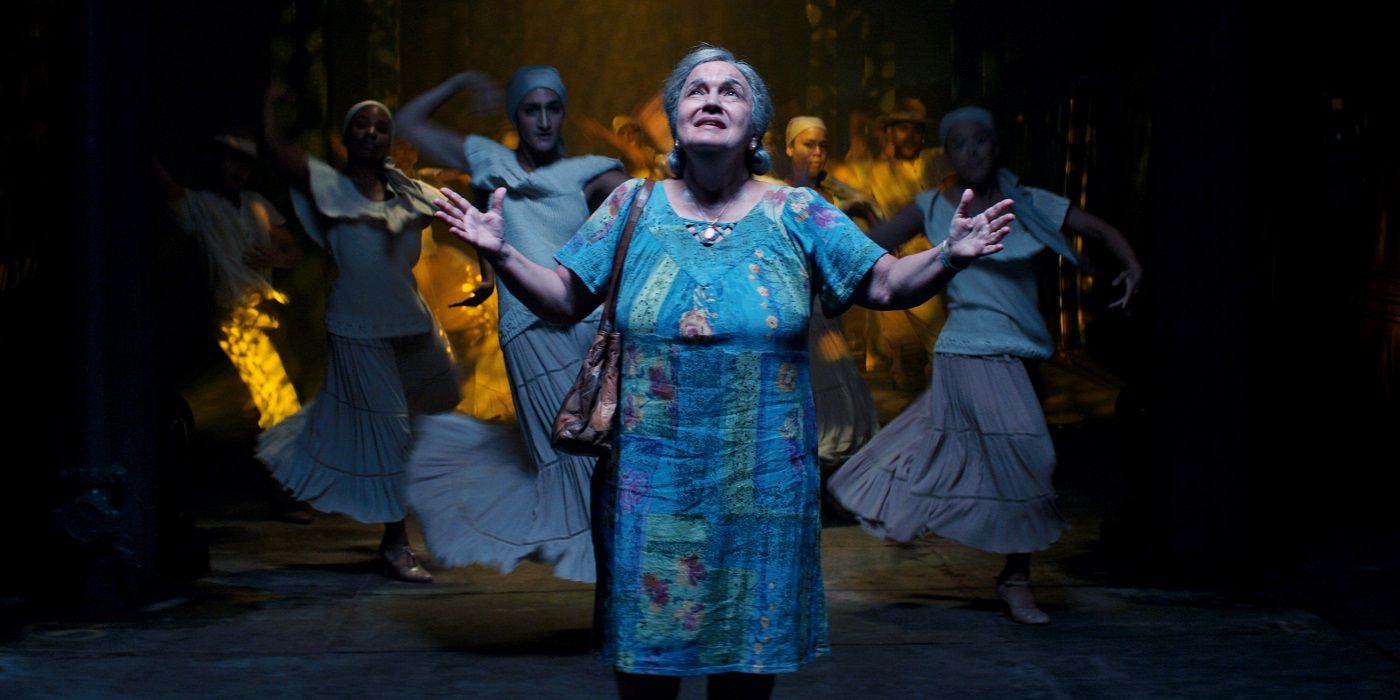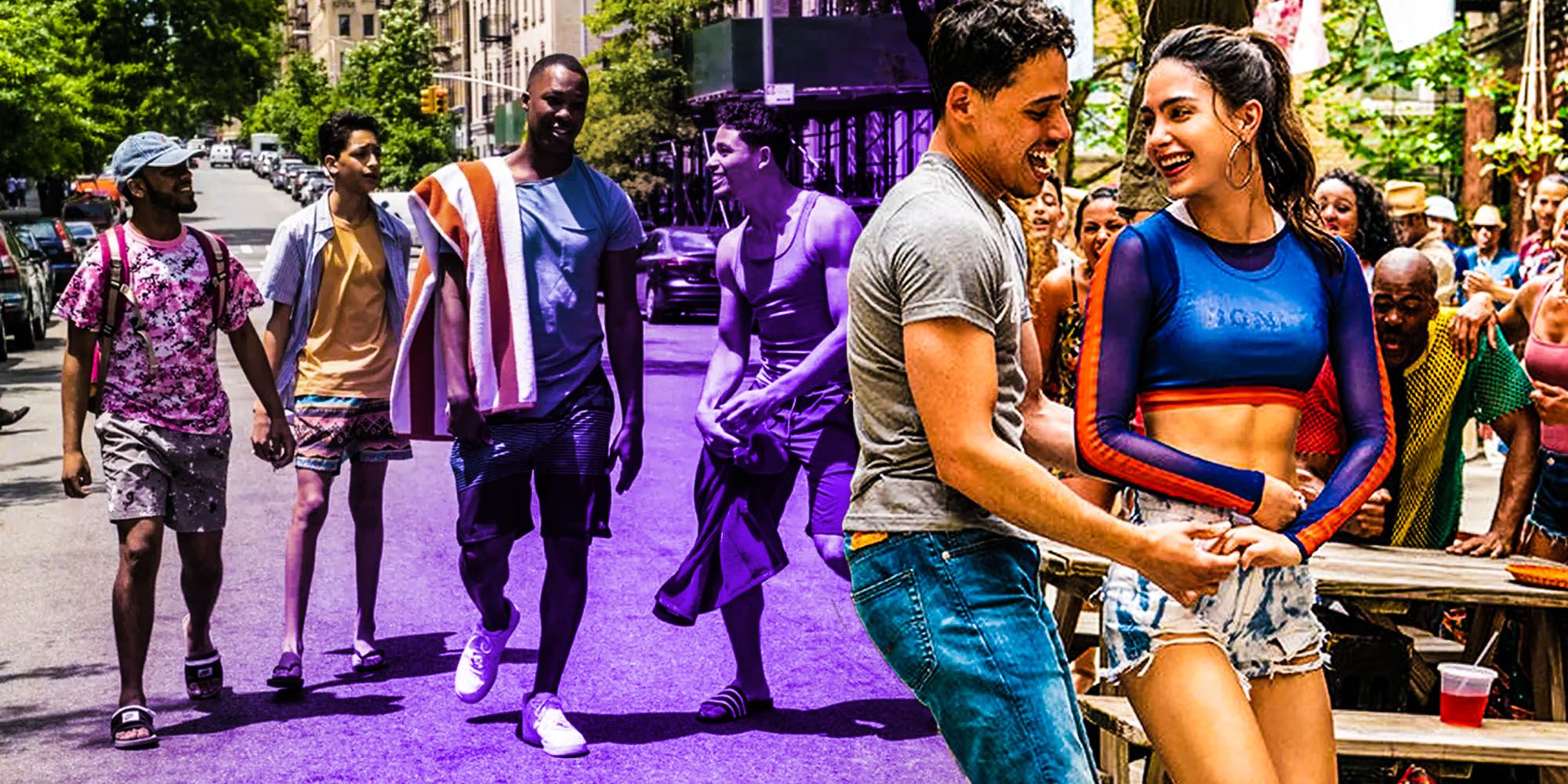The In the Heights movie is very much similar to the Broadway musical it's based on, but there are a few notable differences. The summer-set spectacle penned by Hamilton's Lin Manuel Miranda experienced quite a few changes from stage to the its cinematic adaptation directed by Jon M. Chu (Crazy Rich Asians), which was released (in theaters and on HBO Max) by Warner Bros. Studios. The alterations help to streamline the ensemble-led story and help to pull out some themes, which effectively allows In the Heights to tap into a more accessible relevance.
After all, the world is a different place than it was when the lights first came up on Miranda's inaugural Broadway outing in 2008. In the Heights, a project started by Miranda while he was still a college student, took the musical theatre world by storm; it was groundbreaking for the inclusion hip hop and rap music in its energetic score - an experiment that would come into even fuller fruition in his mega-hit Hamilton a few short years later (Hamilton's resounding success was likely a contributing factor for the film version of Miranda's earlier show coming to the screen in the first place). However, the filmed version of In the Heights sees far more changes than were made to Disney+'s Hamilton, which is more-or-less a recording of the live stage show.
Like many other successful adaptations, Chu's In the Heights needs to make some changes to the source material to make the story work most effectively in a different medium - one that is far more director-driven and does not have the luxury of breaking for intermission halfway into the runtime. Songs changed and were cut. Storylines where altered. Even entire characters disappeared. Here are the major ways in which the In the Heights film deviates from the Tony Award winning stage musical.
In The Heights Musical Has No Narration From Future Usnavi
Unlike the musical, the In the Heights film implements a new framing device in which Usnavi (Anthony Ramos), presumably from the future, narrates the main story to a group of kids while on a faraway beach. Throughout the movie, the action is frequently interrupted with short cutaways to Usnavi's tropical locale, which we learn by film's end is actually mirage of sorts, a manifestation of the sueñito - or "little dream" - that could have been had the fast-talking bodega owner actually made it onto his Dominican Republic-bound plane. It turns out that one of the children who has been listening his story is Usnavi's own daughter, Iris, whom he had with Vanessa (Melissa Barrera).
By contrast, the Broadway version of In the Heights begins without preamble. The lights come up on Usnavi's block and the title song beings. In the show, Usnavi frequently breaks the fourth wall to address the audience directly, but he seems to be living in the current moment, not dropping in from the future to weigh in on his past experiences. The decision to include a framing device for the film helps to cover up some of the gaps in the story that come with the inevitable cutting of songs (for example, the explanation of the origins of Usnavi's name comes in the song "Hundreds of Stories," which was ultimately cut for the movie). Having Usnavi address the kids, the In the Heights film becomes more about legacy and reveals that in the years that have followed, he has continued to be a real staple and leader of his community. The audience also sees that Usnavi has earned a happily ever ever with Vanessa. The show leaves things hopeful but ambiguous.
The DREAMer Storyline Was Added for In the Heights Movie
Both the musical and film appear to take place at the same time they were produced. Therefore, if the movie version of In the Heights is meant to simulate the late 2010s or early 2020s, there would, of course, be renewed fears for Usnavi's beloved community, as some of its members are likely undocumented DREAMers. In fact, the film greatly augments the Sonny character (played by Gregory Diaz IV) - a character notably passionate about social justice in the musical - as he navigates the hurdles and disadvantages he will face as a DREAMer. His realization that he, unlike his idol Nina (Leslie Grace), will be unable to attend college is truly heartbreaking, as is the scene with his lawyer near the end of the film, in which he is told that the odds of achieving citizenship are not in his favor.
In an interview with CinemaBlend, Miranda explained, "The concept of DREAMers and undocumented immigrants, which is on the front page of the conversation the Latino population of the United States is having with itself. To have one of the most beloved characters in the show struggling with that status, it just makes it real for people in a way that a headline doesn’t." The film never lingers too long on these issues, opting to instead celebrate the power and connection present within the Washington Heights community. However, the threat that looms over the DREAMers is nevertheless felt and the audience is left with no real resolution other than the injustices giving Nina newfound determination to give Stanford another go. The dangling on Sonny's subplot feels true to life, as there is currently no real solution for the many undocumented people who face these devastating and oftentimes insurmountable realities.
Nina & Benny's Relationship
While Benny (Corey Hawkins) and Nina have history before the events of both the screen and stage version of In the Heights, the film shows them having had an actual romantic relationship prior to Nina's freshman year. It is revealed in the film that Benny chose to end things with Nina, not wanting to be "ball and chain" to her as she ventured out on her own. The onstage source material strongly implies that Nina and Benny have always harbored feelings for one another, but at a distance.
In the stage version, the couple's story is far more turbulent than the film would have one believe (much of the "will-they-or-won't-they" tension gets transferred to the Usnavi/Vanessa relationship). First of all, Benny and Kevin's (played by Jimmy Smits) interactions are a bit less cordial and there is a general feeling that Benny is viewed, at least on some level, as an outsider not "good enough" for the apple of Kevin's eye. After losing his job, Benny drunkenly blames Nina, leading to an argument breaking out during the club scene. However, the two reconcile shortly afterward and share the night together. The two characters are left in a similar place in both the stage show's and film's conclusions: Benny vows to champion Nina as they date from a distance.
Nina's Family Life
In the musical In the Heights, Nina's mother Camilla is still alive and routinely appears in scenes with Kevin and Nina, functionally serving as the rock of her family. In fact, the Broadway production featured a crowd-pleasing solo number by Nina's mother called "Enough," in which Camilla voiced her exasperation at Nina and Kevin's continual arguing and encourages them to work it out. Removing Camilla from the In the Heights' story really helps the audience better relate Kevin's protectiveness of his daughter - she is all he has left.
The Rosario's financial troubles prove a hurdle to Nina's education in both onstage and onscreen, however, in the stage version, the reason for Nina wanting to drop out of college is a little different. In the original script, Nina's grades suffer because she spends much of her valuable study time working two jobs to scrape by. The In the Heights film attributes Nina's desire to return home to certain experiences at Stamford which left her feeling isolated and - as in one appalling anecdote in which she was searched when her white roommate accused her of stealing jewelry - discriminated against.
In the Heights' Lottery Winner Is Revealed Earlier
Chu chooses to draw out In the Heights' mystery of who won the lottery far longer than the original stage version does. In fact, Abuela Claudia's show-stopping number "Patencia y Fe," performed by Olga Merediz originally ended with her revealing to the audience that she is the lucky lottery ticket holder (Chu repurposes the song as a heartfelt sendoff to the community's matriarch before her death). The song and reveal happens about three quarters of the way through the stage show's Act I and Usnavi is told by Abuela of her fortune shortly thereafter - several scenes before she dies.
The choice have the audience wait to discover who won the life-changing $96,000 prize money makes sense on a narrative level, as it leads to one of the film's most emotion-filled moments. Aided by Ramos' jubilant performance, the scene in which Usnavi finally discovers the ticket in Abuela Claudia's belongings and goes on to shout his gratitude to her watchful spirit is incredibly satisfying on a narrative level. There is a great sense that the neighborhood's mother figure will continue to look after her loved ones, even when she is gone.
In the Heights Musical Songs Were Cut From The Movie
As with most cinematic adaptations of musicals, several songs from In the Heights' original production didn't make the cut. Kevin had a song entitled "Inútil," which served to outline his backstory and desire for a better life for his daughter. Nina and Benny have a beautiful duet called "Sunrise" that takes place the morning after their fight at the club. Abuela and Usnavi sing "Hundreds of Stories" in which the audience learns more of Usnavi's origins and his desires to leave Washington Heights (bits information from this song are sprinkled throughout the film). As mentioned, since Nina's mother Camilla is excised from the movie, so is her song "Enough."
Additionally, a few songs which grapple with the loss of Abuela Claudia (who dies a bit earlier in the film than she does in the play) are cut as well. Kevin has a short song, "Atención," in which he sadly announces Abuela's passing via the dispatch. Nina's solo "Everything I Know," a song that finds her looking through Abuela Claudia's belongings and memories, was likely removed for pacing.
The In the Heights Film Has a More Surreal Aesthetic
Perhaps it's unsurprising given the restraints of live theatre without aide of CGI, but the In the Heights movie gives itself over to a more surreal aesthetic than the stage show does. During Vanessa's wistful "It Won't Be Long Now," enormous banners of vibrant fabrics roll down the sides of buildings as she dreams of a career in the fashion industry. During the energetic "96,000," simple white lines are animated playfully into different shapes as the ensemble raps and sings. In one of the film's most memorable numbers, Nina and Benny perform a gravity-defying dance up and down the sides of buildings, twirling around fire escapes, protruding AC units, and satellite dishes.
While the stage show stays mostly in the realm of a grounded reality (well, as grounded as a world in which characters spring spontaneously into song can be), Chu's interpretation of In the Heights uses the cinematic medium to his advantage. With a story in which every person Usnavi's block is pursuing their own sueñito, these flourishes are reminiscent of the overly saturated and often inexplicable nature of actual dreams. Ultimately, this creative decision, like many others, help to establish In the Heights' place as one of the most successful stage to film adaptations in recent years.

